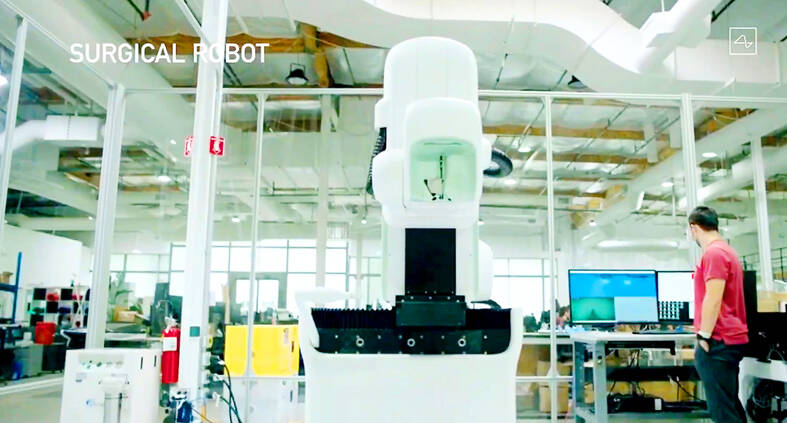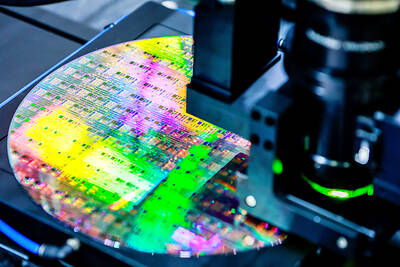The world is on the cusp of a neurotechnology revolution that could transform human health and welfare, but urgent action is needed to protect brain data, experts said on Friday.
Medical neurotechnology breakthroughs have allowed paralyzed people to walk again, or deaf people to hear.
Elon Musk’s Neuralink Corp has publicized advances with brain implants, pushing the idea they could one day be a lifestyle choice rather than a medical device.

Photo: AFP / Neuralink Corp
However, three experts gathered in Paris as part of a panel to advise UNESCO said the technology was already starting to proliferate.
“This is really a crucial moment in human history,” Technical University of Munich professor Marcello Ienca said. “For the first time, we are developing the tools to understand and modify the functioning of the human brain and modify the functioning of the human brain.”
Ienca, research scientist Nataliya Kosmyna and entrepreneur Ryota Kanai stressed that the emerging field was much wider than isolated medical breakthroughs, with an array of consumer products already on the market.
They said the technology would be widely available in just a few years and ethical guidance would be vital.
UNESCO has formed a group of 24 experts to help draft an “ethical framework” for the emerging technology, hoping to get agreement from UN member states by the end of next year.
Musk has positioned himself at the center of efforts to publicize neurotechnology, making eye-catching claims suggesting humans could become telepathic or upload their consciousnesses and in effect live forever.
Some of Musk’s more outlandish statements were probably aimed more at attracting potential investors than reflecting the reality of the technology, Kosmyna said.
However, Kosmyna, who designs and develops wearable devices such as glasses and hats that process brain data, said the field had the potential to transform humanity.
“I absolutely believe in the augmented human and that we are about to create a new species,” she said.
Although the experts were broadly skeptical of many of Musk’s claims, they said his firm was doing some original work.
Ienca said Neuralink was the only firm looking at brain implants for enhancement rather than medical needs.
However, wearable technology was far more likely to turn a profit in the short term, the experts said.
“You not going to drill your skull, but you’re going to wear these” devices, Kosmyna said.
She said that in the next five years classrooms and other settings would be revolutionized by wearable technology that would allow teachers to monitor their students and tell if they were bored, confused or engaged.
UNESCO is aiming to make sure that all such technology respects human rights.
“There can be no neurodata without neurorights,” UNESCO Director-General Audrey Azoulay said in a statement.
Ienca said that that Apple Inc had recently patented technology that would allow the next generation of Airpods to gather brain data.
“Apple will be able to collect brain activity information continuously from hundreds of millions of people,” he said.
The data — which could be used in all sorts of ways, from healthcare to marketing — needs to be protected, he said.
A secondary concern is making sure the products actually do what their manufacturers say.
Devices already on the market claim to all kinds of powers — from solving mental health issues to boosting productivity at work.
“Even neuroscientists don’t know if that kind of claim is true,” said Kanai, CEO of Araya, a Japanese artificial intelligence and neurotech firm.
Of much wider concern was that we could create a “two-tier planet” divided between “the enhanced and the non-enhanced,” Ienca said.
“This could be the end of human social cohesion as we know it,” he said.

TECH TITAN: Pandemic-era demand for semiconductors turbocharged the nation’s GDP per capita to surpass South Korea’s, but it still remains half that of Singapore Taiwan is set to surpass South Korea this year in terms of wealth for the first time in more than two decades, marking a shift in Asia’s economic ranks made possible by the ascent of Taiwan Semiconductor Manufacturing Co (TSMC, 台積電). According to the latest forecasts released on Thursday by the central bank, Taiwan’s GDP is expected to expand 4.55 percent this year, a further upward revision from the 4.45 percent estimate made by the statistics bureau last month. The growth trajectory puts Taiwan on track to exceed South Korea’s GDP per capita — a key measure of living standards — a

Samsung Electronics Co shares jumped 4.47 percent yesterday after reports it has won approval from Nvidia Corp for the use of advanced high-bandwidth memory (HBM) chips, which marks a breakthrough for the South Korean technology leader. The stock closed at 83,500 won in Seoul, the highest since July 31 last year. Yesterday’s gain comes after local media, including the Korea Economic Daily, reported that Samsung’s 12-layer HBM3E product recently passed Nvidia’s qualification tests. That clears the components for use in the artificial intelligence (AI) accelerators essential to the training of AI models from ChatGPT to DeepSeek (深度求索), and finally allows Samsung

Taiwan has imposed restrictions on the export of chips to South Africa over national security concerns, taking the unusual step of using its dominance of chip markets to pressure a country that is closely allied with China. Taiwan requires preapproval for the bulk of chips sold to the African nation, the International Trade Administration said in a statement. The decision emerged after Pretoria tried to downgrade Taipei’s representative office and force its move to Johannesburg from Pretoria, the Ministry of Foreign Affairs has said. The move reflects Taiwan’s economic clout and a growing frustration with getting sidelined by Beijing in the diplomatic community. Taiwan

READY TO HELP: Should TSMC require assistance, the government would fully cooperate in helping to speed up the establishment of the Chiayi plant, an official said Taiwan Semiconductor Manufacturing Co (TSMC, 台積電) yesterday said its investment plans in Taiwan are “unchanged” amid speculation that the chipmaker might have suspended construction work on its second chip packaging plant in Chiayi County and plans to move equipment arranged for the plant to the US. The Chinese-language Economic Daily News reported earlier yesterday that TSMC had halted the construction of the chip packaging plant, which was scheduled to be completed next year and begin mass production in 2028. TSMC did not directly address whether construction of the plant had halted, but said its investment plans in Taiwan remain “unchanged.” The chipmaker started